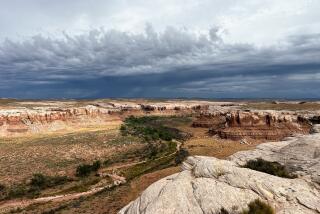More Thorough Review Ordered on Utah Drilling
- Share via
WASHINGTON — Siding with environmental groups, a federal judge here has directed the Bush administration to conduct a more thorough environmental review before exploring for oil outside Arches National Park in Utah.
The decision will delay the planned seismic exploration project in the Dome Plateau -- 23,000 acres of scenic desert popular with hikers, mountain bikers and other outdoor enthusiasts -- and is the most recent of several setbacks that the courts have dealt the administration as it tries to expand oil and gas development in the West.
It is also one of several examples of courts agreeing with environmental groups that the administration had too narrowly interpreted the National Environmental Policy Act, the Magna Carta of environmental laws.
Environmentalists said the decision has broad implications for the administration’s efforts to hasten oil and gas development in the West.
“The decision will affect the Bush administration’s whole approach to opening the West to drilling. They’re not going to be able to do things quite as quickly as they wanted to,” said Sharon Buccino, an attorney for the Natural Resources Defense Council, one of the environmental groups involved in the case.
However, an administration official stressed that the decision was a narrow one.
“It is a very specific decision regarding this specific company and their specific activities on public lands,” said James Hughes, deputy director of the Bureau of Land Management, the agency within the Interior Department that is involved in the dispute.
Hughes said the administration expects the ruling to have “no impact” on its efforts to expedite oil and gas development and restrict the application of the National Environmental Policy Act.
The law requires the government to conduct a comprehensive environmental assessment and seek public comment whenever it plans major actions that could have significant environmental consequences.
To determine the extent of oil and gas reserves under the southern Utah desert, WesternGeco, an exploration company, planned to send multi-ton vehicles known as “thumper trucks” through the area to collect seismic data. The trucks would pound the ground to emit shock waves; the size and type of waves that come back would indicate the location of deposits. Environmentalists warned that the process could ravage the desert’s delicate soils and vegetation, as well as the wildlife that depends on it.
In the case, which was resolved late Friday, U.S. District Judge James Robertson ruled that in its haste to approve the project, the agency failed to follow the requirements of the law. Specifically, the BLM failed to thoroughly consider alternatives other than the one proposed by the company, such as restricting the trucks to existing roads.
“BLM failed to adequately study, develop and describe appropriate alternatives to recommended courses of action,” the judge wrote.
The judge also criticized the Interior Board of Land Appeals, the administrative review board, for failing to consider evidence submitted by the plaintiffs during the review which showed that the company’s seismic trucks made 15-inch-deep ruts in the fragile desert soil. The agency’s environmental assessment anticipated 4-inch ruts.
“The proof of the 15-inch ruts surely tended to show that BLM had made unsupportable assumptions about the damage the trucks would cause, that BLM had not properly identified the likely effects of using these trucks to collect the required seismic data, and that BLM’s hurried analysis was not the ‘hard look’ required by law,” the judge wrote.
Environmentalists said they expected the Interior Department to make another decision after a more thorough review.
“This decision sends a strong message to the Bush administration: You have to obey the law,” said Stephen Bloch, an attorney with the Southern Utah Wilderness Alliance, the lead plaintiff in the case.
Hughes said the agency would reconsider the project before another decision is announced, thus delaying it several more months.
Seismic vehicles completed half of the project before it was halted in February pending an administrative review.
More to Read
Sign up for Essential California
The most important California stories and recommendations in your inbox every morning.
You may occasionally receive promotional content from the Los Angeles Times.










